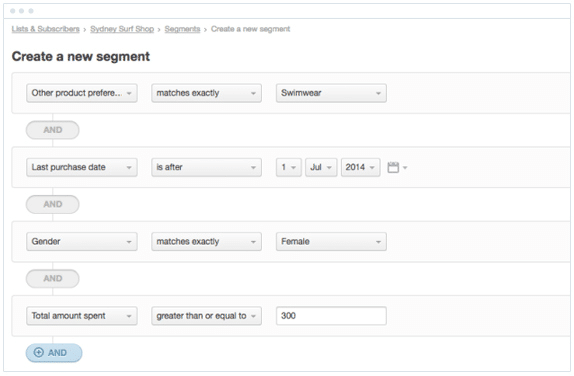One of the great challenges for email marketers is to find the perfect formula for sending brand messages. Your emails need to come at the right time, go to the right people, and say the right things.
Finding that balance involves several different factors, but it all starts with using email segmentation within your campaigns.
Sending a marketing email blast is a bad move
It’s true that you can always just send email blasts to everyone on your email list. The people who want to get your message will still receive it, and it might give other people a chance to engage if they are drawn to your message.
However, your email performance will suffer if you are not targeting the right people with your messages. Email segmentation allows you to take your contact list and group your audience into smaller categories. Your groups will have fewer contacts in them, but you’ll be able to send them more relevant information, which improves the likelihood that they will engage or convert.
Marketers say segmented email campaigns generate 760% more revenue.
There are many different ways to segment your email lists
While there are many ways to segment your email audiences, some of the simplest ways involve grouping your contacts by demographics, age, and location. You can also segment your list by purchase behavior, interests, and job title.

Source: Campaign Monitor
For instance, you could take your customers who spend the most money or make the most frequent purchases and send them special VIP offers or deals. Your email copy could say something that thanks them for being such a valued customer. However, this email wouldn’t work for new customers or inactive contacts.
How to measure email segmentation
If you are using email segmentation properly, you should notice improved performance in your core email marketing metrics.
- Open rates: A good subject line is still the best way to generate email opens, but segmented audiences will be more likely to open the email if the subject line indicates it is relevant to them.
- Click rates: Email segmentation allows you to personalize your email copy specifically for your audience. Simply localizing your email content can improve click-through rates by as much as 13%.
- Unsubscribe rates: Contacts unsubscribe from emails when they don’t feel the content is relevant to them or it’s not what they expected to receive. You can use email segmentation to make sure the right people are receiving your messages.
All of these metrics can easily be tracked using your email service provider’s (ESP) dashboard and basic reporting tools.
Does it really matter?
Email segmentation is an absolute must if you want to run a successful marketing campaign. You should be putting your audience into groups before you plan an email so you can cater your strategy and messaging specifically to that individual segment’s pain points and needs.
However, just because you segment your emails doesn’t necessarily mean you will have a winning campaign. Segmentation is just one piece of the puzzle. Even if you are reaching the right people, you still need to make sure you are sending them relevant messages at the right time. Focus on the customer journey for each segment when you build your campaigns.
What now?
Now that you know why email segmentation is important and how it can positively impact your overall marketing success, you can begin putting this strategy into practice for your next email campaign.
If done correctly, you should notice an immediate improvement in your average click and read rates. This will also tell you about your overall list quality and if you need to take steps to improve your email deliverability.